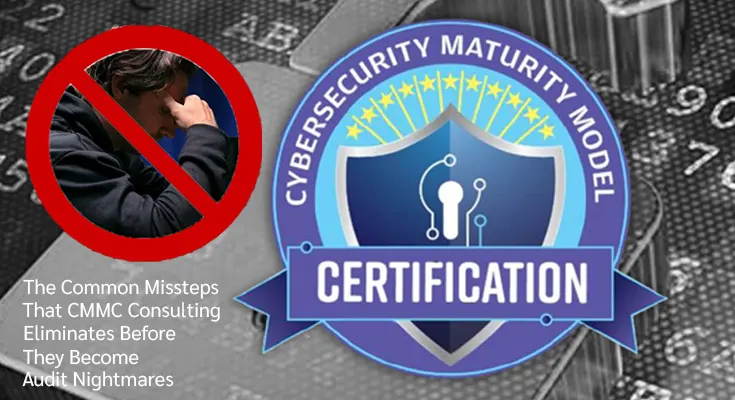Preparing for a compliance audit can be a stressful process, especially when simple missteps lead to unexpected failures. Many contractors believe they are fully prepared, only to realize too late that overlooked details can derail certification efforts. Expert CMMC Consulting helps organizations identify and fix these missteps before they create costly delays or compliance failures.
Misinterpreting CMMC Requirements and Leaving Critical Security Gaps Unchecked
A common mistake in the compliance process is assuming that all security measures are already in place. Many organizations rely on outdated interpretations of compliance requirements, leading to critical security gaps that auditors will quickly identify. Without a precise understanding of CMMC Level 2 Certification Assessment expectations, businesses risk missing key controls necessary for passing an audit.
Consulting experts analyze security policies, system configurations, and access controls to ensure they align with current standards. They provide a clear CMMC assessment guide that eliminates uncertainty and ensures all compliance gaps are addressed before an audit. Rather than guessing whether requirements are met, contractors gain confidence knowing their security framework meets every necessary benchmark.
Rushing Documentation at the Last Minute, Leading to Missing or Inaccurate Records
Waiting until the final stages of preparation to complete documentation is one of the fastest ways to fail an audit. Incomplete policies, missing records, and vague reporting can raise red flags for auditors. Documentation errors not only slow down the assessment process but also indicate a lack of structured compliance management, which can result in additional scrutiny.
A well-structured CMMC guide ensures that documentation is prepared long before an audit takes place. CMMC Consulting professionals assist in developing, organizing, and maintaining records so they accurately reflect security protocols and compliance efforts. By keeping documentation updated and readily available, organizations avoid the stress of last-minute revisions and ensure their reports withstand auditor review.
Overlooking Employee Training, Putting Compliance at Risk During an Audit
Even with strong cybersecurity policies in place, untrained employees pose a major compliance risk. Auditors assess not just the security measures on paper but also how well teams understand and follow security protocols. If staff members are unfamiliar with compliance procedures, their mistakes can lead to failed assessments and operational vulnerabilities.
A structured training plan keeps teams prepared and knowledgeable about CMMC Level 2 Assessment expectations. Regular training sessions ensure employees know how to handle controlled unclassified information (CUI), follow security best practices, and respond appropriately to threats. With proper education, staff members become active participants in compliance efforts rather than weak points in security.
Ignoring System Vulnerabilities That Auditors Will Flag as Major Security Risks
A well-documented security plan means little if the actual infrastructure contains vulnerabilities. Many businesses assume their networks, applications, and access controls are secure, only to be caught off guard when auditors uncover weak points. These vulnerabilities can range from outdated software to misconfigured access permissions, all of which can result in compliance failures.
CMMC Consulting helps businesses conduct thorough vulnerability assessments, identifying security flaws before an official review. Consultants guide teams through risk assessments, ensuring that weaknesses are patched and security controls are properly implemented. By proactively addressing system vulnerabilities, organizations prevent last-minute surprises and maintain compliance with confidence.
Assuming Current Cybersecurity Practices Are Enough Without Proper Assessments
Many organizations believe their existing security measures are sufficient without realizing that compliance requires more than just general cybersecurity practices. DoD standards are specific, and security measures that once met compliance requirements may no longer be adequate under updated regulations. Without a structured CMMC Certification Assessment, businesses risk falling behind on compliance without even knowing it.
Regular assessments provide a clear understanding of whether security controls align with current standards. CMMC Consulting experts conduct gap analyses to determine where improvements are needed, ensuring businesses stay ahead of compliance requirements. Instead of assuming security measures are sufficient, contractors receive expert guidance on adapting to new regulations and maintaining strong defense measures.
Failing to Establish a Clear Incident Response Plan Before an Audit Review
A well-defined incident response plan is a critical part of compliance, yet many organizations either overlook it or assume an informal response strategy is enough. Auditors expect to see a structured plan outlining how security incidents are detected, managed, and reported. Without one, organizations may struggle to prove they can handle breaches effectively, resulting in compliance failures.
CMMC Consulting ensures that businesses have a tested and well-documented incident response plan before an audit. Experts help organizations outline clear protocols for identifying threats, responding to incidents, and mitigating damage. Having a structured response strategy in place not only meets compliance standards but also strengthens overall security, protecting sensitive information from cyber threats.




